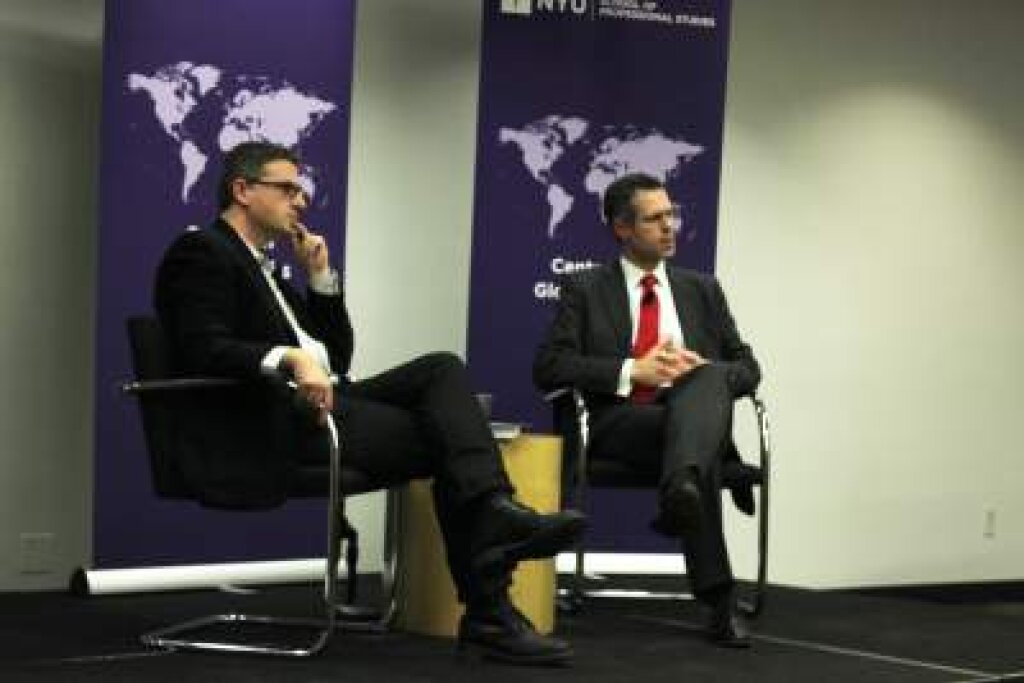On November 19, 2014, the NYU School of Professional Studies hosted “A Cold War in the Shadows?,” a talk with Victor Madeira, a Senior Fellow at the Institute for Statecraft in London, moderated by Mark Galeotti, NYU Professor of Global Affairs. The event was the final chapter of Revisiting Russia, a series of three lectures jointly sponsored by the NYU Center for Global Affairs and the Jordan Center.
Madeira, who recently published Britannia and the Bear – a book on the Anglo-Russian intelligence wars at the time of Bolshevik Russia, was called to discuss the ways in which history can provide a useful framework to understand developments in the contemporary world. The talk began with Galeotti’s observation that it is “much easier to be talking about cold wars” in recent times, following a chill in the relations between Russia and the West over Ukraine. Looking back to the interwar period, he noted how some “strikingly familiar themes” can be identified in Russia’s modus operandi.
Subsequently, Madeira went on to articulate the three main vectors that imbue the thesis of his book: continuity, memory and the “notion of taking the long view.” He then proceeded to explain how the pre-revolutionary imperial rivalry between Russia and Britain over Central Asia and India partly fuelled the ensuing intelligence wars. Another important element, however, was the resentment over Western (including British) intervention during the Russian civil war.
Discussing the operations of the Russian intelligence services vis-a-vis Britain, Madeira identified three main practices: espionage, subversion and infiltration of the elite circles. In particular, the practice of espionage showed the preference for human over technical intelligence, described by Madeira as “a case of ingenuity over technology.”
Out of the three practices, however, subversion proved to be much more important to the Soviets, remaining significant today. Madeira noted how the Soviet intelligence services would use front organizations, thus targeting the enemy on a much more intellectual basis, for example. This strategy was aimed at convincing the new recruits of the worth of their cause by getting them to work under the guise of fighting fascism.
As regards the Soviet infiltration of the British elite, Madeira explained that the practice, which saw them target the intellectual circles of educational institutions such as Oxford and Cambridge Universities, and Eton and Harrow Schools, for instance, was more common in the 1920s but is no doubt still happening today.
Later, Madeira went on to analyze the ways in which these three practices have evolved in recent years. He highlighted, for example, how today’s wider range of potential recruits can fit the profile of Orthodox faithfuls as much as the anti-liberal European far-right and how recruitment techniques have changed significantly. “Today money plays much more of a role,” he said. In addition, over the past 15 years, the use of natural cover by Russian intelligence officers and agents in the West has become commonplace, with people like students and businessmen often being spotted by the Federal Security Service (FSB), brought to the attention of the Foreign Intelligence Service (SVR), and subsequently receiving training after recruitment.
As regards the elite circles that are being targeted, Madeira says that since the early 2000s, the focus has become economic intelligence, with Russian intelligence services relying on lobbying and operating within NGOs, businesses and think-thanks. Moreover, the use of front organizations continues to be common. “There are certainly concerns about some environmental NGOs,” primarily in Central and Eastern Europe, Madeira said. The aim is maintaining European dependence on imported Russian gas, by looking to infiltrate anti-fracking movements. The anti-EU far-right movement in Europe also provides, according to Madeira, potential ground for recruitment.
Talking more closely about Crimea and Ukraine, Madeira pointed out that there is an erroneous tendency to read those events as an expression of a new type of war. “One of the things that struck me the most, especially in post-Crimea, was the number of media commentators who all of a sudden stood up and said: ‘There is this new form of warfare, hybrid warfare, nonlinear...,’ he said. According to Madeira, however, “what we see now is no more no less what we saw during the Cold War”: active measures – a playbook dating back to the Bolshevik Revolution.
Madeira expressed concern at the level of unawareness regarding the intelligence strategies employed by Russia among the political elites. “Politicians are only now beginning to wake up to what is really going on,” he said. In particular, he stressed that operations in the realm of information are being thoroughly exploited by the Russians, thus marking a shift from traditional conflict to a conflict of influence. This “war in the mind” and “on the human consciousness,” however, is not matched by the West, where more immediate security concerns drive the attention towards more practical considerations such as the deployment of tanks in the Baltics.
Focusing on the information war waged by Russia, Madeira noted how it often shows itself as an updated version of Soviet strategies. The use of Internet trolls and the introduction of new media outlets such as RT are two of the most common methods utilized, in an attempt to disrupt any genuine debate and radicalize Russian diaspora and nationals from the targeted countries who are most sympathetic to the Kremlin’s views. With growing shares of the budget allocated to such operations, Madeira pointed out, the Soviet practice of seeking to influence the enemy’s way of thinking is still very much present today. After Galeotti asked what can the West do to counteract these strategies, Madeira said that one key is the education of government officials, politicians and the public, and the awareness that “a lot of the residual knowledge” from the past is applicable today. “We are paying for our neglect,” he said.
As he took questions from the audience, Madeira described the Russian approach to intelligence as much more comprehensive than the Western one. “It is much broader and much more pervasive,” he said as he disclosed how Russians go as far as thinking of using perception-altering chemical agents as part of information warfare. He also noted that Russia’s comprehensive approach to information operations is being closely studied by countries such as China, Iran, Turkey and Thailand.
Answering a question regarding the Western environmental NGOs allegedly working with the Russian intelligence services, Madeira reiterated that suspicions are limited to a very small number of people and organizations, particularly in Central and Eastern Europe. Finally, Madeira discussed how the recent developments in Ukraine are affecting Russia’s relations with China by bringing the two countries closer together. At the same time, he stressed that China remains a concern for Russia. Under the current circumstances, Russian operations in China have to be more cautious, as “there is much more concern about annoying them.”



